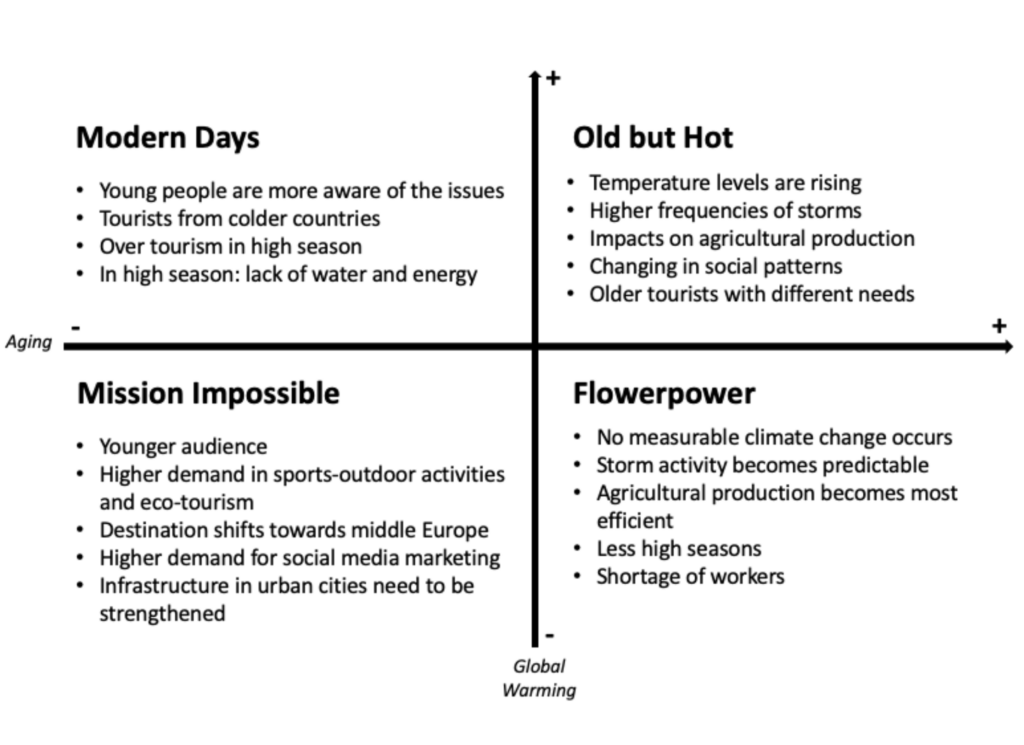As the world around us shifts and changes, the tourism industry is no exception. Now more than ever, we are forced to confront the reality of how our actions today impact the world of tomorrow. With this in mind, we have explored potential scenarios for the future of tourism in Schleswig-Holstein, a region rich in history and natural beauty. These scenarios, created with an eye towards sustainability, reveal fascinating possibilities and critical recommendations for industry stakeholders.

Scenario 1: “Old but Hot” takes into consideration the escalating effects of climate change. As average temperatures rise, the environment undergoes a slow transformation, leading to higher sea levels and more frequent storms. These climatic changes, while challenging, also present an opportunity to adapt and innovate. From infrastructure development to sustainable agriculture, every aspect of the region must evolve to withstand the new climate.
In this scenario, the tourism demographic skews towards an older population. This group, with its more disposable income and interests in cultural experiences, could prove beneficial for local businesses, especially during off-peak seasons. However, the region needs to be mindful of their specific needs, particularly given their sensitivity to extreme heatwaves. Implementing climate-adaptive facilities and providing a variety of enriching, low-impact experiences are key recommendations for this demographic.
Scenario 3: “Flower Power” posits a situation where the climate remains stable, with no more rise in sea levels or unpredictable weather events. This stability could significantly boost agriculture and mitigate the economic costs of adapting to global warming.
This scenario sees a younger demographic, creating potential for economic growth through new job opportunities and changing spending patterns. However, to cater to this new audience, the region must create activities that appeal to their interests and preferences. This could include increasing language accessibility, focusing on eco-tourism, and embracing digital technology for enhanced visitor experiences.
Regardless of the scenario, the underlying theme for Schleswig-Holstein’s future tourism is sustainability. It is vital to foster a tourism model that respects and protects the natural environment, supports local communities, and provides meaningful experiences for visitors of all ages.
For “Old but Hot”, it means designing heat-adaptive infrastructure and ensuring medical facilities are prepared to handle heat-related illnesses. For “Flower Power”, it entails focusing on sustainable business practices that appeal to a younger, environmentally-conscious demographic.
Investment in renewable energy sources, waste management systems, and sustainable transportation options should be priorities for both scenarios. Moreover, it is essential to work closely with local communities, ensuring they benefit from tourism economically and culturally without being overwhelmed by visitor numbers.
Finally, education is a key sustainability tool. By educating visitors about the region’s environment, culture, and the importance of sustainable tourism, we can encourage more responsible behavior, ensuring Schleswig-Holstein remains a beautiful and welcoming destination for generations to come.
The future might seem uncertain, but with foresight and commitment to sustainability, Schleswig-Holstein can navigate any scenario with resilience and success.